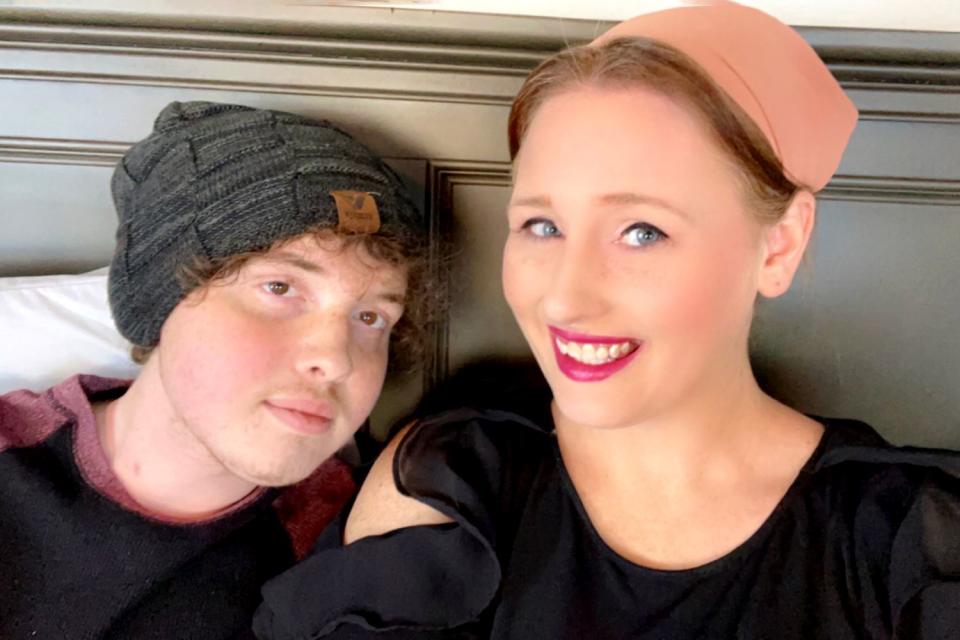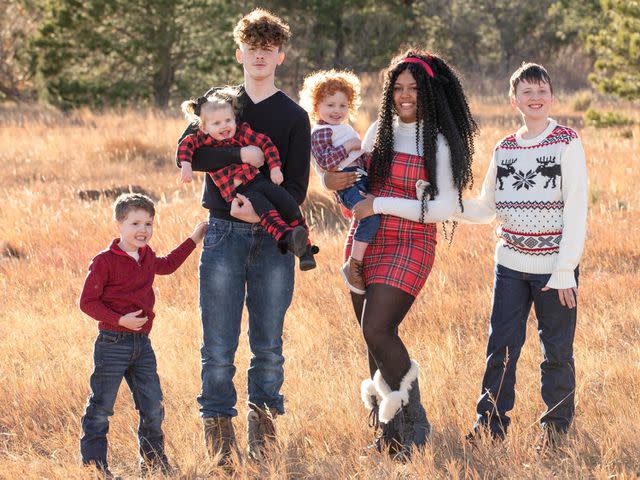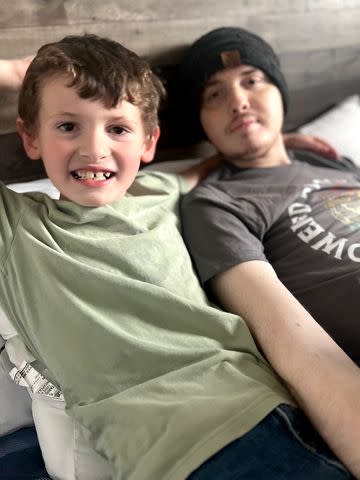Teen's Wisdom Tooth Removal Reveals Autoimmune Disease. Months Later, He Needs a Lung Transplant (Exclusive)
Stephanie Pesterfield's now 17-year-old son Lonnie went from a healthy teen to being listed for a lung transplant in less than a year's time, she tells PEOPLE

Stephanie Pesterfield
A Colorado mom who took her son to get his impacted wisdom tooth removed never imagined that the surgery would lead her family down a months-long medical maze that nearly cost her teen his life.
Lonnie Pesterfield was a happy and active 16-year-old boy who loved weightlifting and dreamed of becoming a firefighter in October 2022, when mom Stephanie Pesterfield first brought him to a dentist.
"I actually used to joke before that he's my healthiest child," Stephanie, a mom of six, tells PEOPLE. "Beforehand, he was active and healthy."
Never miss a story — sign up for PEOPLE's free daily newsletter to stay up-to-date on the best of what PEOPLE has to offer, from juicy celebrity news to compelling human interest stories.
Stephanie explains that Lonnie complained of tooth pain and was told he'd have a routine wisdom tooth removal, only to discover that one of those teeth was impacted.
"In my head, I thought this was just a normal surgery. We're going to get this done and then everything will be okay in a week or two."
When they went in, the oral surgeon evaluated his teeth and decided to remove all four of the wisdom teeth.
"We had it done and it seemed to be going great, at first. He did everything that they told him to do, and because I took him to the same place I took my 18-year-old daughter to, I wasn't too worried at the time," Stephanie shares. "But then about 10 days after his surgery, Lonnie was in so much pain."
After another set of visits to the oral surgeon, Lonnie continued to get worse.
"A week from the last time we saw the dentist was when Lonnie was in the ER, coughing up blood, which started our whole journey of finding out that he has an autoimmune disease."
Although both the family and medical professionals initially thought Lonnie's condition was a result of the dental surgery, it later became clear that the surgery triggered the yet-to-be-detected but already-present autoimmune disease. Pneumonia, another theory as to why Lonnie's lungs were being so severely impacted, was another course explored.
"Everyone assumed it was pneumonia because that made the most sense and two days after he was admitted to the hospital, he couldn't breathe correctly because his lungs were filling up with blood and they had to put him on the ventilator," Stephanie explains.
"The whole idea was just to get his body back to base level. They sucked out a bunch of blood from his lungs and they were like, 'Going forward, it should be fine. We're not really sure what's going on, but we think it sounds like really severe pneumonia.’ "
Off the ventilator, Lonnie continued to deteriorate, to the frustration and concern of the family.
"He was actually getting worse, and no one could give us any answers. They had tried like five antibiotics at that point and nothing was really working, until one of the pulmonologists was like, ‘Hey, I think that this might be something else,’ " she recalls.
"He had been a pulmonologist for 40-plus years, so he had seen a lot. He was in an adult hospital and not just a children's hospital, and he said, 'I think it might be this weird autoimmune disease,' and so he did 20 to 30 tests on Lonnie, just to make sure it wasn’t anything else."
At that point, the family learned Lonnie has GPA vasculitis, an uncommon disorder that causes inflammation of the blood vessels in your nose, sinuses, throat, lungs and kidneys, per the Mayo Clinic.
"We were told, ‘He's young. We've given him a bunch of steroids. We're going to give him this gold-standard treatment for it. It should all be okay,' " she recalls, though they were also warned there was "most likely going to be some type of permanent damage to his lungs."
As a mom, Stephanie was horrified to learn they wouldn't know the extent of the lung damage for months.
"I remember thinking, 'How horrible would it be if he started to recover and then suddenly got really bad, really sick again,' and that’s basically what happened," she shares.
Lonnie was released from the hospital, with the family following up with a number of professionals to tend to damage to his kidneys, liver, spleen and pancreas.
"He was starting to get better in December. They had tested his lung function, it was like 58 percent. He was doing better, and then near the end of December, I don't know, something just didn't feel right. I didn't know what was going on because I didn't know what to look for. But we thought he was getting better and then in January, things slowly took a downhill turn."
Noting the teen was "getting more shortness of breath," she says that by February, things progressed quickly.
"By February, his lung function went down to 14 percent, literally six weeks after he was testing at 58 percent."
The quick month brought more testing, during which the family was told that Lonnie had reached the point where he would need a lung transplant.
Traveling back and forth from the hospital in Denver to the family's Colorado Springs home and taking turns with Lonnie's dad, Stephanie navigated the chaotic situation "day by day."
"Even when you don't have a child that is in the hospital, having six kids and four are disabled is a lot. It's just a lot," Stephanie says. "Looking back, I really don't know how we made it work, how we functioned."
"There's not a guidebook on this. You just do the best you can and make the best choices you can, which entailed asking a lot of questions and doing a lot of research. When they told us that he needed a lung transplant, for the next two weeks in the hospital, I literally asked them to reexplain it to me like every single day."
Armed with information from Lonnie's medical team and their own research and reinforced by the support of family and friends, Stephanie tackled the decisions surrounding her son's "very complex case."
Though the process of listing Lonnie began in February, his name wasn't officially added to the transplant list until May.
"By the time he was listed, he was already in the hospital at the University of Colorado because he was so sick. His health was deteriorating fast and it was the safest place for him to be. But he was alert," she explains.
"The day before he was listed, he was in the hospital room playing video games with his friends on the gaming laptop I got him to help keep things a little bit normal during his stays. And from the time he was listed until we got news of a match 36 hours later, I don't think anyone — myself, his dad, Lonnie himself — I don't think that anyone had the time to process what it exactly meant."
"He was listed on a Monday evening, and then, by Wednesday morning, they had called me to tell me that they had found a match and his surgery would be in 12 hours," she says. "It was just so quick."
And for Lonnie, the prospect offered more promise than fears. "The doctors asked him a couple of times, 'How are you doing, mentally? How are you handling things?' and he was handling them well. I asked him now, after it all, if he was scared and he said, 'No, I was just ready to have a life again. I wanted to live again.' "
In fact, it wouldn't hit Stephanie until four days after Lonnie's successful transplant what her son had been through.
"I remember walking down the hospital hall and it literally hit me. ‘Oh my God. Lonnie had a lung transplant.’ It's the weirdest thing to explain but you don't have the time to process it," the mom says. "You know it's happening but emotionally and mentally, I was just like, ‘Oh my God, we're really on the other side of this,’ and so it was It was just a lot to take in. It was a very big surgery that came with so many risks and so many possible complications that it was just really scary to think, ‘This is the end. Either my son's gonna live or he's gonna die.’ "
Stephanie was used to sharing her life and family on social media but took a different approach to telling Lonnie's story.
"When I did start sharing it, I started sharing it because I was scared. I was the most scared that a person probably can ever be in their life," she admits. "And I just remember thinking if positive vibes, energy, prayers, if that's what's going to get my son through this, then let's do it."

Stephanie Pesterfield
"I had talked to Lonnie about it too because I always want to make sure I'm getting my kids' permission before posting things online like that and he said he was okay with it as long as I wasn't showing him because he was so sick. His skin tone was gray and he didn't look or feel good, obviously. He didn't want to be on camera, which was fine."
Once he started understanding more about what was wrong medically, Lonnie encouraged his mom to share details that could raise awareness.
"He said, 'I actually want you to share this. I want you to share every ugly part of this because if they one person's life, then I want to do that.' Because a lot of people that have vasculitis end up dying from vasculitis before they even know what it is, because it's assumed that it's pneumonia," Stephanie explains.
"It was more to bring awareness, to autoimmune disease, the signs of sepsis. We've always used my channel to educate others as a special needs family, so we tried to do the same with this. So we're educating and bringing awareness to autoimmune diseases, vasculitis, and now, organ donation."
Today, Lonnie is "doing well" and getting used to the many different therapies that will help further his recovery.
"He is improving. Things are getting much better and he's being able to slowly reclaim his life," Stephanie says. "His life will never look like it did before because he's on a crazy amount of medications now and he's immunocompromised for the rest of his life. But he's breathing room air and he doesn't need any equipment. He doesn't need to be in a wheelchair or use a walker. So even though his life does look different, he's getting to live. And that, I think, is what we focus on the most because there was a point where we did know if him living was going to be an option."
As a mom, the changes in Lonnie's haven't been lost on Stephanie.
"Before this, Lonnie was always an amazing kid who is kind and wants to help others. He's always been an old soul like that, someone who wants to fix it when something is wrong. He's very giving and despite the crazy amount of trauma of knowing he was essentially dying in November, he's held onto it. And it's given him so much more appreciation and perspective. He wants to live his life to the fullest — not necessarily traveling or doing big things like that but making sure every moment counts."
Lonnie is most looking forward to "being able to be a big brother to his siblings again" as the second oldest.
"He's excited to be able to live life, be a great brother to them play outside and get back to as normal of a life as he possibly can."
Stephanie hopes parents learn from her ordeal to "speak up" and "be your kids' advocate."

Stephanie Pesterfield
"Don't be afraid to think outside of the box, to push for information directly. Speaking up, especially when you feel something is off with what they're thinking, is important, to go with your gut. Every time I had a bad feeling about something, it ended up being for a reason. At the same time, trust your team. It's a lot of trust to hand over, but it's okay to do and to also do your own research, carefully."
And she hopes everyone who was touched by Lonnie's story will also consider the power and possibility of organ donation.
"We are very, very fortunate. Lonnie obviously had a short wait for a donor, but there are many people that end up dying before they can get a match. It's a very hard choice when you're put in that situation but it can literally give someone their life back. It's hard to imagine because you don't know what families you're helping out, but it could be a family like ours. It could be a 17-year-old who made all the right choices and just got a really bad run of luck."
For more People news, make sure to sign up for our newsletter!
Read the original article on People.

